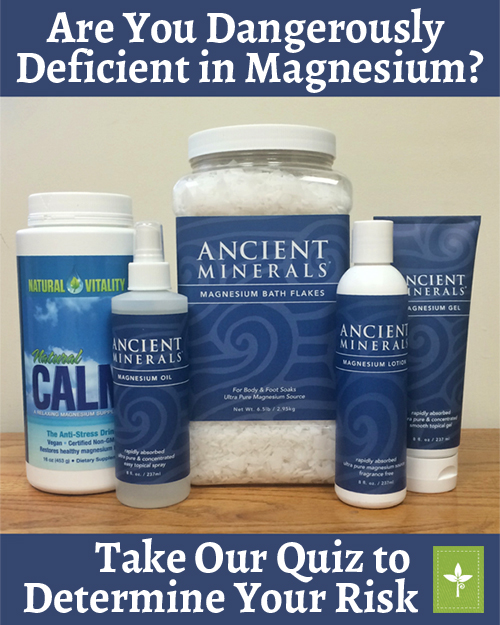
Are You Dangerously Deficient In Magnesium? Take Our Quiz To Find Out
Did you know that the World Health Organization reports that approximately 75% of the US population is deficient in magnesium? This important mineral is the 4th most abundant mineral in your body, as well as a necessary co-factor for hundreds of enzymes. Healthy magnesium levels are vital for optimum health.
Magnesium’s Roles within the Body
- Activate Muscles and Nerves
- Create Energy by Activating Adenosine Triphosphate (ATP)
- Help Digest Proteins, Carbohydrates, and Fats
- Serve as a Building Block for RNA and DNA Synthesis
- Act as a Precursor for Neurotransmitters like Serotonin
The Health Benefits of Magnesium
- Increase Bone Strength and Density
- Promote Strong and Healthy Teeth
- Promote Heart Health
- Promote Healthy Blood Sugar Levels
- Promote Healthy Blood Pressure Levels
- Promote Muscle Growth, Strength, and Flexibility
- Relieve Sore Muscles and Joints
- Prevent and Alleviate Depression
- Prevent and Alleviate Migraine Headaches
- Prevent and Alleviate Insomnia
- Prevent and Alleviate Constipation
- Alkalize the Body
Calcium to Magnesium Ratio
As previously mentioned, it is estimated that 75% of the US population is deficient in magnesium. This is NOT the case for calcium. Our modern diet contains plenty of calcium, and products that are fortified with calcium cover our grocery store shelves. The imbalance between calcium consumption and magnesium can be quite harmful, as these two minerals are supposed to be consumed at a 1:1 ratio. If you have too much calcium and not enough magnesium in your body, your muscles will tend to spasm, and this can be particularly detrimental to your heart health.
Why Has Magnesium Disappeared from Our Diets?
According to Dr. Carolyn Dean (MD, ND, and author of The Magnesium Miracle): “Magnesium is farmed out of the soil much more than calcium. A hundred years ago, we would get maybe 500 milligrams of magnesium in an ordinary diet. Now we’re lucky to get 200 milligrams. People do need to supplement with magnesium.”
Major Risks for Magnesium Deficiency
There are three MAJOR culprits for modern day magnesium deficiency: stress, prescription medications, and fluoride. Prescription medications tend to deplete your body of its stored magnesium. A common chemical found in prescription drugs -and in our drinking water- is fluoride which seems to be particularly damaging. Above all, chronic stress depletes your body of magnesium. If you are constantly experiencing stress –whether it is from work, relationships, exercise, etc- you are very likely to be deficient in magnesium.

Simple 10 Question Quiz to Check for Potential Magnesium Deficiency
- Are you 55 years old or older?
- Do you drink carbonated beverages on a regular basis?
- Do you regularly eat pastries, cakes, desserts, candies or other sweet foods?
- Do you experience a lot of stress in your life, or have you recently had a major medical procedure such as surgery?
- Do you drink coffee, tea, or other caffeinated drinks daily?
- Do you take a diuretic, heart medication, asthma medication, birth control pills or estrogen replacement therapy?
- Do you drink more than seven alcoholic beverages per week?
- Do you take calcium supplements without magnesium or calcium supplements with magnesium in less than a 1:1 ratio?
- Do you experience anxiety, hyperactivity, or difficulty sleeping?
- Do you experience muscle spasms, cramps, or twitches?
Other Warning Signs of Potential Magnesium Deficiency
- Numbness and Tingling
- Seizures
- Personality Changes
- Abnormal Heart Rhythms
- Coronary Spasms
If you have one or more of the symptoms listed above, or if you answered yes to any of the questions on our quiz, you may wish to have your magnesium levels checked for deficiency.
How to Increase Magnesium Intake
The first step is determining that you are, in fact, magnesium deficient. The next step is increasing your body’s magnesium intake. You can increase your magnesium intake with whole foods, supplements, and topical treatments.
- Dark Leafy Greens
- Nuts and Seeds
- Seafood
- Avocados
- Bananas
- Dark Chocolate
- Whole Grains
- Yogurt and Kefir
- Figs
- Coffee
Magnesium Supplements
Magnesium supplements come in two forms – the kind you ingest and the kind that you absorb through your skin. Some people prefer to consume a magnesium supplement – for this purpose; we recommend Natural Vitality Natural Calm Magnesium products. They are powdered magnesium supplements that are designed to be added to hot water to create a magnesium rich drink.
Some people are sensitive to magnesium when ingested. Anyone who is sensitive to consuming magnesium may benefit from topical magnesium supplements. In fact, some evidence suggests that topical magnesium supplements are even more effective than traditional magnesium supplements. For topical magnesium supplements, we recommend Ancient Minerals Magnesium products. Ancient Minerals has an extensive line of topical magnesium products – pure magnesium oil, magnesium lotion, magnesium gel made with aloe vera, and magnesium bath flakes.


Comments are disabled for this post